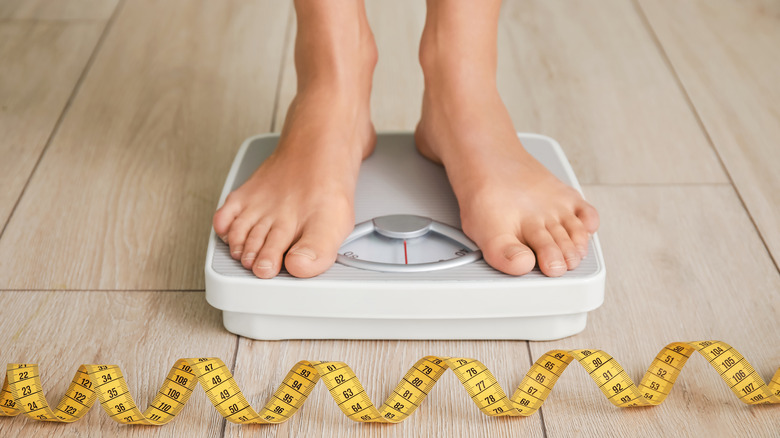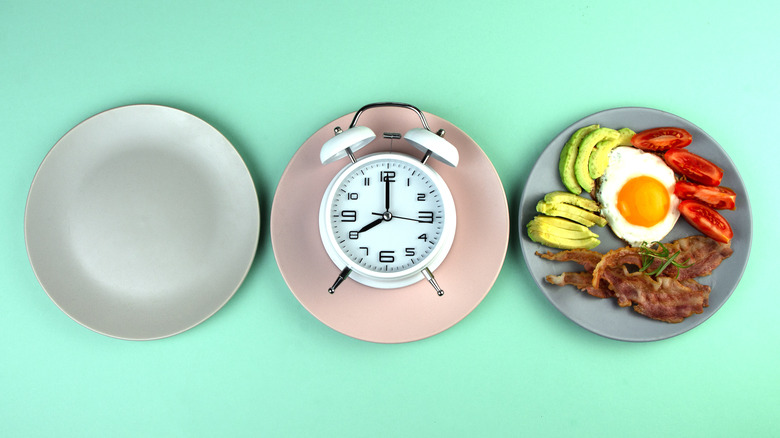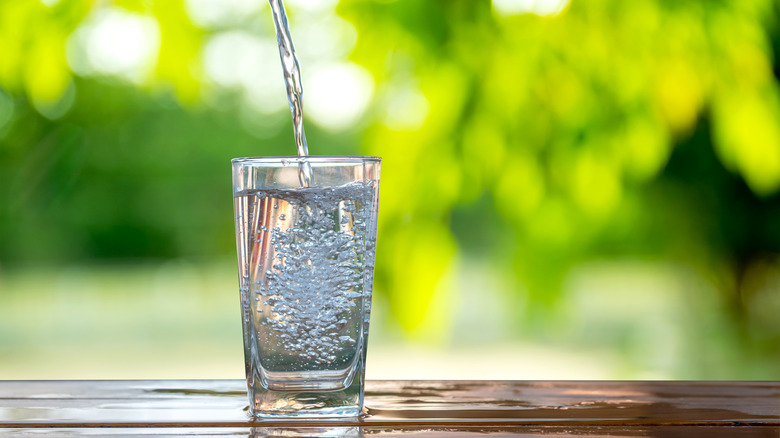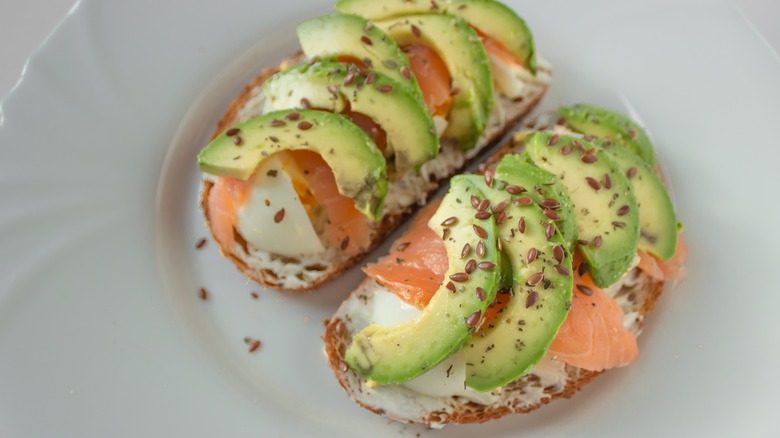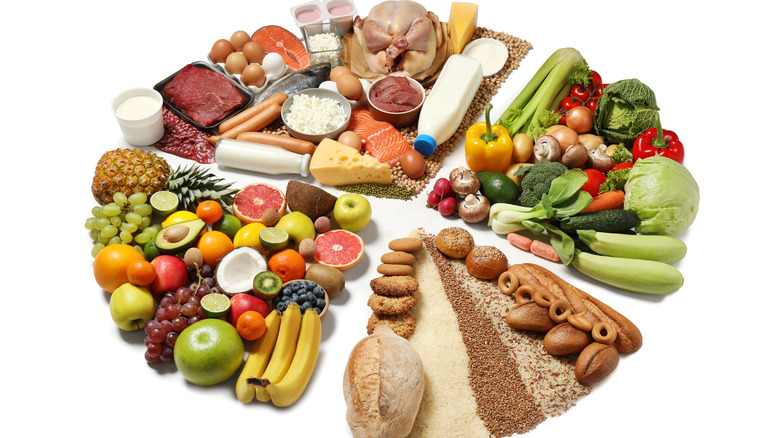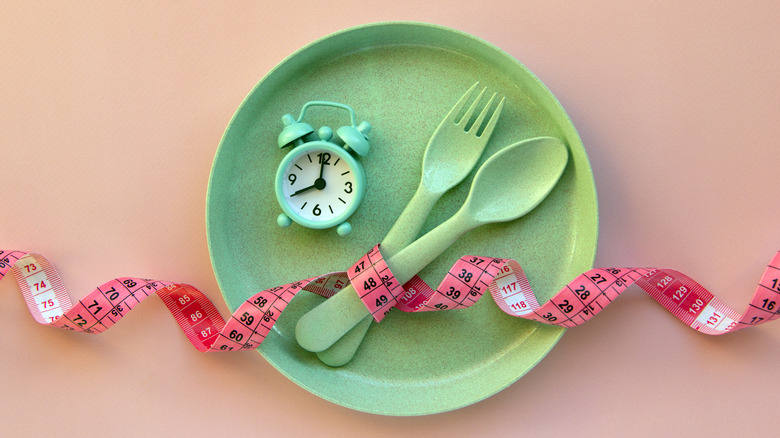Diet Mistakes You Never Knew You Were Making
Choosing to embark on a new diet can be scary. The internet, and your family and friends, are all full of opinions about what they believe are the do's and don't's of dieting. In an attempt to follow each individual's advice to the letter, it can be all too easy to find yourself falling victim to some common dieting mistakes. Moreover, many of the most wildly popular diet mistakes are insidious — meaning that while our bodies know about the chaos our choices are creating inside, our brains might be convinced that we are doing the right things.
The worst part about some of these diet mistakes is that they have the potential to derail your efforts, affect your results, and potentially lead to health complications. Finding the right diet to suit your body and lifestyle is definitely a Goldilocks and the Three Bears situation. What works for one person's body might wreak havoc on your insides, while the tactics that provide success for your body might leave another person in a total food mood (via Shape). Here are some of the most common diet mistakes that you didn't know you were making.
Skipping breakfast
Cue the "breakfast is the most important meal of the day" rhetoric and feel the proverbial eyeballs of the teenager inside of you roll back into your skull. It seems like you can't talk to anyone about food, diet, and health without some goody-two-shoes telling you that you shouldn't skip breakfast because it is the most important meal of the day. Though this advice is annoying to hear on repeat, it turns out that those peddling this advice are onto something.
While logically it kind of makes sense to skip breakfast as a means to decrease your overall caloric intake for the day, this tactic in action might leave you ravenous when lunchtime rolls around. A ravenous body does not sound decisions make, which can potentially lead to greater caloric intake later in the day. In a study published by The Obesity Society, it was determined that study subjects who ate higher calorie breakfasts had more weight loss success than those who ate more calories later in the day. According to Shape, waiting until your body is running on empty is a surefire way to sabotage your dieting efforts.
You don't sleep enough
Getting adequate rest is a crucial component that can lay the groundwork for your dieting efforts. Not getting enough sleep has been linked to higher-than-average body mass index readings in adults and in children (via Healthline). On the most basic level, ensuring that you are getting to bed early can help prevent late night snack attacks, which can bring down even those with the strongest willpower.
Beyond that though, not sleeping enough is thought to mess with your hunger hormones and appetite. When you don't sleep enough, your appetite increases due to hormone fluctuations. This can leave you feeling emptier day after day, which can encourage you to consume more calories, often predominantly in the form of fat. Our brains and bodies recharge while we sleep, so it makes sense that both would function better after a solid night of zzzs. Getting enough sleep can also charge our bodies up enough to allow us to power through workouts, which can help with weight management. When our brains are firing on all cylinders, we are better equipped to make healthy choices and engage our mechanisms of self-control.
Waiting too long between meals
Much like skipping breakfast, waiting until your body is sputtering to a stop (and everything anyone around you says makes you irate) is a great way to sabotage your dieting efforts. Waiting until your desire to eat is gnawing away at your insides affects the way your brain processes the act of eating. As explained by Shape, "This approach puts you in a feast or famine mindset, going into a meal so, so hungry and leaving so, so full."
Because of this, waiting too long between meals can lead to over-consumption when you finally sit down to eat, which can add up to more calories over time. Aside from just the extra calories, over-eating on a completely empty stomach could lead to a host of GI issues that could dissuade you from maintaining your efforts. The standard over-eating side effects include bloating and fatigue, which are best avoided when you are on a mission to feel your best. To combat the issues that arise from waiting too long between meals, experts recommend nibbling on smaller, more frequent meals throughout the day. It is also helpful to begin to understand your body's hunger cues so that you can munch on something before the feelings of being able to eat a horse set in.
Not eating enough
Portion control is one thing when it comes to dieting. But severely restricting calories is another. YES — you do generally need to create a caloric deficit to lose weight (via WebMD), but leaning into this notion with too much gusto can lead to you over-eating in the long run and potentially even create metabolic complications. This is where the over-arching toxicity of diet culture overlaps with the science behind losing weight. A small calorie deficit will likely yield favorable results, but overdoing it will not lead to sustainable weight loss.
In an article published by Self, registered dietitian Emily Cope-Kyle explains that many of her clients, especially women, come to her asking about ways to feel fuller for longer while trying to exist on a diet of 1,200 calories per day. Kyle explains that the emphasis on counting calories instead of nutrients can actually hinder our abilities to lose weight and impede our longevity. By focusing on providing our bodies with adequate amounts of the nutrients we need, we can super-charge our bodies and lose weight in a healthy and sustainable way.
Drinking sugary beverages
Drinking enough water is absolutely a component of healthy, sustainable weight loss (via HUB from Johns Hopkins University). However, drinking fruit juices and sodas can often slow your weight loss progress without you even realizing what the culprits are (via Healthline). At this point, we can all generally accept that sodas and sugary beverages are not good for us, and they make it hard to cut the weight, since liquid calories have the tendency to add up quickly. In fact, cutting out soda is often one of the first diet moves that people make.
It is all too easy to underestimate the amount of calories and sugar in drinks. Plus, our brains do not process liquid calories in the same way they process those from solid foods. So even after you down a glass of orange juice, you'll still find your body craving food. So after you eat your meal, however healthy, you'll still have consumed more calories and sugar because of those provided by the juice, which can lead to a caloric surplus when this occurs day after day.
Switching to all low and no-fat foods
The 90s called on their weird, transparent landline and they want their non-fat foods back, thanks. Unfortunately, most of these foods — many of which have been labeled specifically as "diet foods" — can degrade the rest of the dieting efforts you might be making (via Healthline). Yogurt is a super common example of a food with an off-kilter reputation. Manufacturers are known to promote their products after removing the fat from them. They tout them as diet products because, of course, they want you to believe that fat is the enemy of a successful diet. What they do not necessarily tell you is that to make these products taste good, they often compensate by adding huge amounts of sugar.
Fat is a necessary macronutrient and avoiding it at all costs is likely to leave you feeling more hungry, which can lead to eating more over time. While there are recommended upper limits on daily fat intake, especially while dieting, the recommendations surrounding sugar as set forth by the Centers for Disease Control and Prevention (CDC) are far more stringent. The CDC recommends no more than 12 grams of sugar per day if you are consuming 2,000 calories per day. The range for healthy fat consumption is anywhere between 44 and 77 grams per day on a 2,000-calorie-per-day diet (via Cleveland Clinic). Using logic, we can determine that removing fat and replacing it with sugar is counterintuitive.
Not drinking enough water
While cutting out sweetened beverages is one of the keys to a success diet, failing to consume enough water is yet another way to sabotage your hard work. Drinking enough water is crucial for your body on a cellular level, but it can also aid in your dieting efforts (via Everyday Health). Taking a few swigs of water before a meal can help your brain send the signal that you are fuller earlier than without taking a few sips of water. The same goes for a water-dense vegetable salad or a brothy soup, as registered dietitian Amy Gorin explained to Self.
Beyond just helping you feel a bit fuller as you eat, ensuring that you are properly hydrated can cut down on headaches, which have been known to lead to stress eating. Gorin told Self that one of the best ways to make sure that you are staying hydrated is to find a way in which you enjoy drinking water. Whether you like drinking water through a straw, from a wide-mouthed water bottle, or from a coconut shell like Mowgli in The Jungle Book, keeping your water close by and in a vessel of your choosing helps you to drink more.
Setting unrealistic goals
You know how the saying goes, you can only eat an elephant one bite at a time. We are not out here trying to literally eat elephants, of course, but the metaphor tracks. As with nearly all things, lofty goals are great, but small, realistic goals often lay the groundwork for success (via Forbes). When it comes to dieting and weight loss, this principles ring true.
It is tempting to want to start your diet journey off by writing down huge goals and aggressively cutting out different food groups. Unfortunately, setting yourself up for failure by aiming too high at first is likely to discourage you (via Healthline). Instead of thinking, "I want to lose 50 pounds," start with a tangible and scientifically sound goal such as one to two pounds per week. As the weeks add up, so will the poundage that you lose. By staying the course, trusting the process, and allowing yourself to reach and celebrate smaller milestones, you'll be setting yourself up for greater success in the long run.
Avoiding fat
Carbohydrates, fat, and protein are the macronutrients that power our bodies, and a general balance of all three is one of the healthiest ways to eat, according to Healthline. Each macronutrient provides our bodies with nutrients that are essential for optimal functioning. And we need a pretty hefty amount of all three, hence the title "macronutrients." To the dismay of many dieters who aim to lose body fat, the fact that fat is a macronutrient is rather stressful. But cutting out dietary fats in an attempt to lose body fat won't necessarily yield the results you might assume. Instead, neglecting to consume enough fat — especially unsaturated fats like those found in nuts, seeds, avocados, and some fish among other foods (via Mayo Clinic) — could impede your efforts.
Dietary fats help lead to feelings of satiety, or fullness, which can help you regulate your intake at meal time (via Self). Some fats can even manage your cholesterol levels, decreasing your risk of some cardiovascular complications (via Mayo Clinic). Often, the effort to mitigate fat consumption ends in an over-consumption of refined carbohydrates, which can further hinder your dieting prowess (per Self).
Avoiding carbohydrates
We know, we know — low-carb diets have been having an unending moment of popularity the last few decades. But that doesn't mean that they are the best choice for long-term, healthy weight loss. In fact, experts advise hopeful dieters to avoid falling into the trap of cutting out any one of the three macronutrients (via Self). This is mostly because each one of the macronutrients, carbs included, plays a key role in keeping our cells happy and functioning (via Healthline). When our bodies are functioning well from a cellular level, it can actually help us reach our dieting goals.
The current dietary guidelines recommend that carbohydrates make up 45-65% of our total diet. However, these guidelines recommend healthy carbohydrates, so think a banana, not a donut (via Dietary Guidelines for America). It's true what they say — not all carbs are created equal. Instead of trying to cut out all carbohydrates as you diet, it is best to consume carbs with a keen eye for nutrition. Instead of chowing down on a few donut holes as you make your way out the door, focus on reaching for a healthy carb that offers vitamins, minerals, and far fewer refined sugars. You'll get bonus points if your meal includes a bit of fat and protein, because after all, that is what a balanced diet is all about (via NBC News).
Cutting out food groups
Much like cutting out an entire class of macronutrients, cutting out entire food groups will likely sabotage your dieting efforts, not help them. Deciding to cut out an entire food group likely won't be sustainable in the long run, which is why it is not an effective dieting tool, as explained to Self by registered dietitian, Sarah-Jane Bedwell.
In general, facing dieting with an attitude of "all or nothing" is unsustainable. Instead of proclaiming that you will swear off of [insert your favorite indulgence food here], reframing your thinking around it is a much healthier approach. By learning how to incorporate your favorite goodies in a healthier and perhaps less frequent way can help you lose weight and maintain it long term. Demonizing certain foods is a great way to make them even more enticing and it isn't necessarily a responsible choice to swear off all tasty foods for a lifetime (via Self).
Over-indulging after a workout
Over-indulging after a workout is an all-too-common trap that many people find themselves in. While it is true that exercising does burn calories, studies have shown that people tend to overestimate the amount of calories burned while underestimating the amount in the foods they consume (via The Journal of Sports Medicine and Physical Fitness). One study even found that many people overestimate the levels at which they exercise. In this study, nearly 30% of participants overestimated their activity levels. Even fitness trackers aren't immune from error on judging things like heart rate and calorie burn, based on one study from the Journal of Personalized Medicine. When all of these overestimations come together, it is pretty understandable to see why this mistake could prevent you from reaching your goals.
Exercise has definitely been proven to give your metabolism a little boost (via WebMD). But instead of banking on this, it is important to understand how to maximize it. Simply put, increasing your muscle mass while decreasing your fat mass is a great place to start (per Adipocyte). It takes more energy to sustain muscle than it does fat, so by slowly restructuring your body composition, you can shift your metabolism slightly. By increasing your muscle mass, you can increase the amount of calories your body burns at rest, which can help you maintain your efforts over the long-term.
Tracking your progress based on your weight
Muscle weighs more than fat (via Shape). We all mostly know this, but that does not mean we know it when we step on the scale day after day as a way to track our weight loss progress. The thing about changing your body composition is that the scale is not going to be the best way to keep tabs on your efforts. This is, predictably, because muscle weighs more than fat. Provided that you are incorporating exercise into your dieting routine, your muscle mass will likely increase as your fat mass decreases. This can lead to the number on the scale staying firmly planted where it is.
If you are only using the scale as a means to track your progress, you are likely to be disappointed, which can lead you to stop putting in the effort because you're discouraged. By shifting your focus onto the fit of your clothes, the physical strength or endurance you are building, or the nutrient content of your food, you will better equip yourself for long-term diet success.
Skipping exercise
Exercising is fantastic, but you already knew that. Dieting and exercising in tandem is proven to be the best way to change your body composition (via Healthline). Strength training is a crucial part of the puzzle. Because muscle has higher energetic needs than fat, building more can boost the amount of calories your body burns at rest. Exercising can also help decrease the inflammation in your body and your blood sugar levels, both of which have been proven to help decrease belly fat, specifically (per Healthline).
Combining aerobic exercise, which is the best way to torch calories, and strength training, which increases muscle mass, is the key to exercising success (via Obesity Reviews). When you add exercise into your sustainably healthy diet, your body will likely respond in all of the right ways. But neglecting exercise and focusing solely on your diet, you'll likely make slower progress, which could further discourage your efforts.

